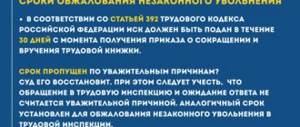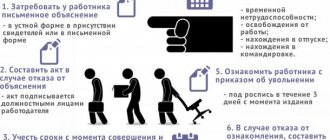Situations of legal dismissal
To understand when the dismissal was made legally, you need to refer to Chapter 13 of the Labor Code of the Russian Federation. It lists the circumstances in the presence of which release from work is lawful.
There are several classic conditions:
- Agreement of the participants. The initiator can be both parties, the main thing is to reach agreement on the timing and reasons for terminating the employment relationship. Usually done on paper. It is also recognized as legal if the employee simply wrote a statement and the employer issued a dismissal order.
- Expiration of the employment contract. The employee is warned in advance (3 days in advance). By continuing to work after this, the employee shows that he is not opposed to the continuation of the agreement. On the part of the organization, consent is expressed in the “non-issuance” of the dismissal order.
- The employee’s desire to leave the company (without explanation). Expressed two weeks before dismissal by writing a statement.
- The employer's intention to terminate the agreement with the person. It must be clearly argued, with reference to a specific paragraph of Article 81 of the Labor Code of the Russian Federation. If the employee is on a probationary period, his dismissal must be preceded by a warning from management that the test has not been passed.
- Change of job as a result of transfer. Conditioned by the employee’s request or consent to such changes.
- Refusal to continue work due to:
- reorganization of the employer, change of owner of its property;
- forced changes in the terms of the agreement;
- proposed transfer to another position or location.
- Dismissal for reasons beyond the control of the parties (severe disability, conscription into the army, etc.)
Important: Violation of the principles of dismissal for any reason makes such termination of the agreement illegal.
If they are leading you to dismissal
You can talk about dismissal without cause if the grounds discussed above are applied incorrectly. For example, the employee’s consent is simulated: under pressure, a statement is written of his own free will, but in practice, management simply reduces staff. Or changes the terms of the contract, taking advantage of the employee’s difficult financial situation. As a result, the person writes a statement again...
Do not give in to pressure and do not write hasty statements. A reduction in staff, for example, gives the right to severance pay (up to two months multiplied by the average salary).
Conflict resolution
Conflict situations arise when there is a sudden announcement of dismissal without warning or any reason. Basically, it is not government organizations that violate the law, but individual entrepreneurs, private firms, and commercial organizations. To protect yourself from sudden illegal dismissal, you need to take certain measures already at the stage of applying for a job:
- do not agree to work without drawing up an employment contract;
- carefully study all the clauses of the contract before signing it;
- do not agree to conditions that contradict the law.
Employers use psychological pressure, threats, resort to manipulation, and deliberately distort legislative acts in order to force an unwanted employee to resign. The proposal to write a letter of resignation of one's own free will is the most common way to solve the problem.
The employer presents this option as the most profitable and convenient for the parties, since it allows one to minimize bureaucratic red tape and hassle. This allows the administration not to pay the dismissed employee compensation or severance pay provided for by law upon dismissal due to staff reduction. An employee who failed to resist management and believed the threats is deprived of the opportunity to further assert his rights.
Mere initiative is not enough to get fired
The management carried out the dismissal on its own initiative. How can an employee understand that he has been fired without reason? The scheme is simple: you need to answer the following questions:
- Is the organization in liquidation?
- Is there a reduction in the number of employees or positions?
- Was the certification carried out and its results were negative?
- Have you received a reprimand or reprimand because you were often absent from work for no reason, refused to undergo an examination, or periodically failed to perform your job duties?
- At least once:
- absenteeism (absent for more than 4 hours in a row without a good reason);
- came drunk or under the influence of drugs and this was confirmed by a doctor;
- disclosed a commercial or other secret that they are obliged to keep;
- stole, intentionally damaged or wasted someone else's property (other employees or employer), which was proven in court;
- violated safety regulations and it was your fault that an accident occurred?
- Have you lost the trust of management due to guilty actions (if you directly work with monetary and commodity values)?
- Have you committed an immoral act while working in educational positions?
- Submitted false documents when applying for a job?
A positive answer to any of these questions means that the employee was fired on the basis of Article 81 of the Labor Code of the Russian Federation. It is legal.
If all the answers are negative, the termination of the employment agreement was made without a legal reason.
Exceptions to the general rule
Exceptions are mainly related to the unlawful behavior of the employee, but in these cases, the employee’s misconduct itself and the related proceedings can be considered a warning.
In some cases, the law allows an employer to fire an employee without warning..
- A fixed-term contract was concluded with the employee to perform work for a temporarily absent employee.
- The certification commission came to the conclusion that the employee is not suitable for the position he occupies due to low qualifications. The commission's conclusions must be formalized in a corresponding act. The employer is obliged to offer another job that would correspond to the employee’s skill level.
- While performing his job duties, the employee was caught committing guilty acts, which include: absenteeism, drunkenness or drug use during work, going to work while intoxicated, theft, neglect of labor safety requirements, which led to an accident, disclosure of secrets related to with job responsibilities.
- An employee whose activities involve money or other valuables may be fired due to loss of trust of the employer.
- The employer became aware that when concluding an employment contract, the employee provided false educational documents and certificates of ability to perform certain work.
The employer must record all cases of violation of labor discipline.
The employee must be disciplined at least three times, only after which dismissal is possible. When absenteeism, the employer is obliged to take measures to find the employee and obtain a written explanation of the reasons. The day of dismissal is the last day worked before absenteeism.
Scheme of employee actions in case of groundless dismissal
What to do if you quit without a reason - algorithm of actions:
- Analyze your actions to be sure that you do not fall under Article 81 of the Labor Code of the Russian Federation.
- Collect evidence of illegal dismissal (the list depends on the grounds recorded in the order and work book) and seek an explanation in writing from management.
- Involve a trade union if there is one at the enterprise.
- Don’t waste time and write a complaint to the labor inspectorate (within a month after the order is issued). Its employees will check the legality of the dismissal and make the necessary inquiries. Especially if management refused to inform the employee of the reasons for terminating the employment contract. An order will be issued that can be used in court.
- Make a decision to go to court to declare the dismissal illegal. Additionally, you can contact the prosecutor's office.
- Participate in meetings.
- Read the court decision.
- Go back to work if the court verdict is positive.
The deadline for filing a lawsuit is 30 days from the date of dismissal (Article 392 of the Labor Code of the Russian Federation). Do not wait long for the decision of the labor inspectorate. Delaying the process is beneficial to the employer.
If an employer fires you without reason, what should you do?
In a situation where an employer wants to force an employee to leave the workplace, the latter should be patient and be prepared for a difficult and difficult struggle. Of course, in a situation where it is necessary to get rid of an employee in any way, the enterprise administration can resort to any tricks. Among the most common are:
- more comments from the immediate superior;
- a sharp increase in workload for no apparent reason;
- rumors about a reduction in an employee’s salary or his possible dismissal;
- removal from projects or individual assignments.
If you have at least one of the listed signs, you should be wary, but do not panic. Here it is important to try to cope with your own emotions, not to succumb to persuasion and blackmail, and to firmly defend your position. It should be understood that if an employer wants to fire an employee without reason, it will do so anyway. Therefore, you need to concentrate as much as possible and enter into negotiations with management, trying to agree on the most favorable conditions for yourself in the current situation. In the worst case scenario, the employer can use a completely “dirty method” and fire the employee under the article, with a reprimand entered into the work book. You should also try to prevent such a situation, because in fact this is a “wolf ticket” for a former employee. Do not forget about this option when discussing options for dismissal or reduction; it is important to objectively assess the situation and conduct dialogue from a peaceful position. However, if it was not possible to reach an agreement and the dismissal occurred in exactly this way, there is no need to panic; you need to seek help from a lawyer who will help you correctly draw up the necessary documents with which you can go to court. In the absence of sufficient grounds for dismissal, the court, as a rule, rules in favor of the employee. If you want to consult us on this issue, call us!
Consequences for the employer
If the dismissal is made in violation of the employee’s rights and this is proven in court, the employer:
- Reinstate the employee to his position.
- Will pay wages for the entire period of inactivity.
- Compensates the plaintiff for court costs.
- Will pay for moral damages to the employee if this request is reflected in the claim and the court recognizes his claim as justified.
- The fine for violation of labor legislation imposed on the basis of Article 5.27 of the Code of Administrative Offenses of the Russian Federation will pay off.
All consequences are the result of the employee defending his rights in court.
Documentation
You should come to court and other organizations with a well-written statement. The claim is filed in the district court. if we are talking about reinstatement at the previous place of work, the claim for labor is decided by the magistrate.
Key points of the statement:
- where is the document submitted?
- information about the applicant (full name, place of residence) or representative
- information about the defendant (company name and address)
- is there an employment agreement in writing?
- exactly how the applicant’s rights were violated, a brief summary of the request to the court
- grounds for filing a claim, supported by documents or witnesses
- indication of attempts made to resolve the problem pre-trial
- a list of documents relevant to the case, submitted in copies
- signature, date of writing.
Labor disputes are considered without payment, according to Article 333.36 of the Tax Code.
Who can be fired without reason?
Directors (managers) are the only employees who can be dismissed without special reasons.
This rule is provided for in paragraph 2 of Art. 278 Labor Code of the Russian Federation. To terminate their labor activity at the enterprise, a decision of the owner of the property or a specialized body of the enterprise is sufficient.
For example, in joint-stock companies, the general meeting of shareholders will be the body that can dismiss the manager. Based on the results of their vote, it is possible to terminate the contract with the director without explaining to the latter the reasons for what happened.
Directors of various organizations (commercial and non-profit) are dismissed according to similar rules. The exception is unitary enterprises, where dismissal must be preceded by certification.
A manager who is not dismissed for wrongdoing claims compensation not lower than his average salary, increased threefold.










